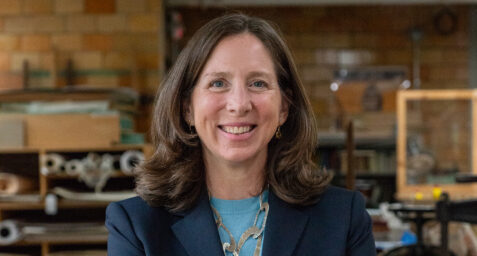A Model For Skilled Training

Nhut Nguyen and Boston Public Library Revitalize In-House Locksmithing with NBSS Training
Skilled trades in the U.S. face a critical shortage of experts, and locksmithing is no exception. Many large organizations once had dedicated locksmiths on staff, but over the years, these roles were often eliminated in favor of subcontractors. Institutions that once phased out these roles, however, are reversing course. The Boston Public Library (BPL) is one such organization.

Nhut “Andy” Nguyen LK ’24 joined the BPL after they had identified the need for an in-house locksmith to meet their widespread security needs. From day one, his easy-going demeanor and work ethic made an impression. Brett Curry, Facilities Manager at BPL, recalls, “Andy is a hard worker. His dedication to his work here at the library was noticed and we knew that helping him gain more skills would not only help Andy, but also help the library by having a trained locksmith on staff.”
To further develop Andy’s potential, BPL turned to North Bennet Street School (NBSS) and its Locksmithing & Security Technology (LK) program. With BPL’s sponsorship, Andy embarked on a rigorous training journey and has continued on as a vital part of the library’s operations—ensuring its locks, doors, and access systems remained robust and reliable.
Meeting Modern Security Demands
Andy’s journey at NBSS began when BPL recognized the need for reliable, in-house expertise. “I was really excited and grateful when they selected me for additional education,” Andy says. “NBSS felt like a great opportunity. I didn’t know the School had a scholarship program available, so I was surprised and very happy that they chose to support me. NBSS made me feel valued, and I was eager to gain the skills I’d need to do good work.”
With an expansive, historic facility and nearly 4 million visitors per year, BPL benefits significantly from having a locksmith on staff who understands its unique security challenges. “Most organizations require security for their personnel, constituents, and property,” says Rob O’Dwyer, Director of Admissions & Enrollment at NBSS. “By supporting students through rigorous training, institutions reduce reliance on subcontractors and build a loyal, skilled workforce.”
Andy’s work highlights the importance of specialized, in-house expertise. He has seen firsthand how locksmiths are an essential part of daily operations for facilities across industries. “A lot of people rely on me to keep everything secure and functioning properly,” Andy says. “I think there are some real opportunities in this field. It’s rewarding to be needed and to have these skills.”
BPL’s partnership with NBSS exemplifies how investing in employee training benefits institutions long-term. Rather than outsourcing security, institutions foster internal expertise tailored to their needs. “We’re seeing greater interest from organizations aiming to bring skilled roles back in-house, especially as many long-time locksmiths retire,” Rob explains. “It’s a model that pays off in the long run in ways that contracting can’t replicate.”
The Balance of Training and Practice
The NBSS Locksmithing & Security Technology program is known for its industry-focused curriculum. Eddy Dacius LK ’13, Department Head and Instructor, emphasizes its relevance: “Our program is at the forefront of the industry, working with leading professionals to develop a suitable curriculum and collaborating with manufacturers for product certifications. Students gain hands-on experience with the latest tools and technology, making them reliable solution providers in real-world scenarios. By the time they graduate, they’re well-prepared to handle complex security needs for institutions like the Boston Public Library.”
Today’s locksmiths need more than traditional skills; they must navigate modern security demands, including building safety, mechanical integration, and advanced master key systems. “Our curriculum covers everything from road technician roles to institutional work, ensuring students are ready for diverse career paths,” Eddy explains.

Andy’s daily responsibilities reflect the importance of his training. From addressing jammed keys to maintaining high-security locks, his skills are essential. “Through NBSS, I gained strong skills in understanding different lock systems and how to manage them efficiently,” Andy shares. “My skills have made me feel more comfortable and confident in maintaining the library’s security needs.”
The program’s structure supports students who balance work and training. Classes run from 7:30 am to 12:30 pm, allowing students to apply what they learn in the afternoons at jobs or internships. Andy’s ability to apply these skills immediately at BPL reflects the real-world value of the program.
For Andy, having the opportunity to train at NBSS has been transformative. “At Boston Public Library, I’m responsible for handling and maintaining various lock technologies, including multi-lock systems, a lot of Medeco products, and master key systems,” he explains. “Every day, I work with different kinds of locks on doors and windows across the facility, sometimes alongside the carpentry team. My locksmithing skills are critical because I frequently replace, repair, and rekey locks throughout the library, ensuring that everything is secure and working properly.”
A Model for Skilled Trades
The path to becoming a locksmith at BPL has also been deeply rewarding for Andy. “I feel like my skills make a difference here,” he reflects. “I’m grateful for the training at NBSS and the support from my managers at the library. Together, they’ve given me the chance to do something meaningful.”
Brett agrees, “Now that Andy has graduated, his knowledge and confidence with his new skill has made his work performance excel to another level that is very valuable to the library.”
As institutions grapple with skilled trade shortages, BPL’s investment in Andy’s training serves as a model for others. By prioritizing employee development through programs like NBSS, organizations can address their unique needs while creating stable career pathways. Andy’s story demonstrates the power of targeted, employer-supported training—helping to rebuild skilled trades while addressing modern security needs.

